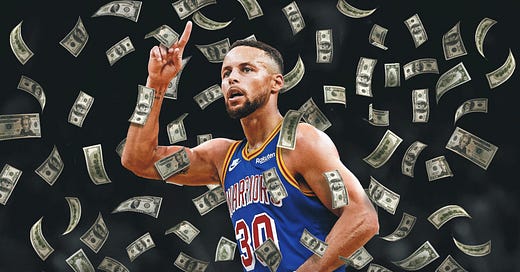Let’s talk about “billionaires.” Last week, The Athletic ran a story titled, “A future NBA billionaire was just drafted. He’s the first of many more to come.” It’s a pretty speculative story, that’s mostly about the changing economics of the NBA, but its hook is the assertion right there in the headline: that one of the players selected in last month’s NBA Draft will become a billionaire, as the story repeats throughout:
“…the NBA is about to start creating billionaires more rapidly.”
“Starting with this rookie class, the NBA could start minting one or more possible billionaires each year.”
“What’s clear is that a future billionaire basketball player might have just been drafted.”
“The sticker shock will eventually dissipate, but the billionaire basketball players will grow in number.”
You might wonder how the story can justify making such a bold claim over and over. After all, according to the Official Billionaire Counters over at Forbes, there are only 724 billionaires in the entire United States. Yet the NBA alone is about to start minting multiple billionaires a year?
But when you read the story carefully, you realize that they are basing “billionaire” status on career earnings: “Any player who enters the league this year…could end up making more than $1 billion in just NBA contracts alone.” This is a pretty dubious claim. For one, LeBron James, the all-time leader in career earnings from NBA salaries, has made roughly $390 million. So someone would have earn more than double what the highest paid player ever has earned in order that to crack the billion mark.
The article includes the fact that some NBA players are already scheduled to make over $50 million in the 2025-26 season, and so therefore you can imagine players getting to the $1 billion mark faster. But, of course, a player would have to make that salary for 20 years to get to $1 billion, and even Hall of Fame careers are generally not that long. Player salaries also don’t grow as quickly or steadily as the article suggests: In 1998, the highest paid NBA player made $33 million; five years it went down to $25 million; five years after that, it was down at $23 million; then ten years after that, it was back at $34 million. So the casual assumption that, because some players make ~$45 million per year now, they will make over $100 million in a few years is pretty baseless.
But, more important than any of these quibbles: This is not really what “billionaire” means! When people use terms like “millionaire” or “billionaire,” they are talking about net worth, not lifetime earnings. Otherwise, someone who made ~$50,000 a year working as, say, an assistant manager at Target for 20 years, would technically be a millionaire. But, as everyone knows, total earnings are not the same as net worth. Workers don’t just keep the money they make, letting it gradually accrue over time; they spend it, generally on basic necessities like food, housing, health care, car payments, credit card bills, childcare, etc.
The implicit assumption in an article like this is that these rules don’t apply to professional athletes. That because they are rich, they are not real workers. And of course, their high salaries do afford them advantages that a typical worker does not have. But they are still workers, and the fundamental divide in capitalism is not between rich and poor, but between owners and workers.
Under capitalism, wealth doesn’t come from work—it comes from ownership. Your net worth is not the sum of your wages—it’s the value of your assets. And that is not an easy thing to pin down, especially for the very wealthy. This is why terms like “billionaire” are mostly bullshit: For people that rich, “net worth” numbers generally come from values owners themselves assign to the things they own, but which can rarely be independently verified. It gives the appearance of objectivity to values that are inherently contested and political.
This is why it is such a profound mistake to define “billionaire” as this article does, as something related to wages instead of ownership. It propagates the idea that “net worth” is some objective value that basketball players can accumulate through their on-court skills. In reality, “net worth” is a result of the political power of the ownership class. A “billionaire” is someone who owns things that the ownership class says is worth over $1 billion—that’s it. And no matter how rich an NBA star might get, so long as he is a worker, he will never have that power.



